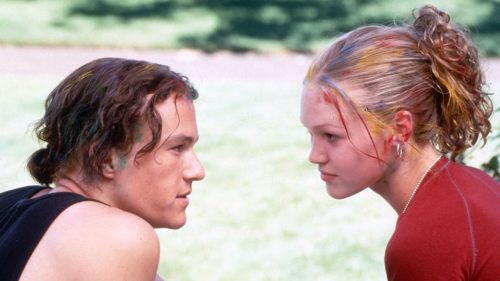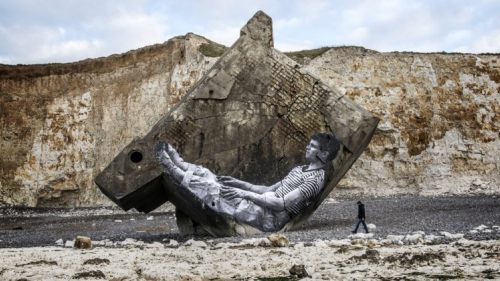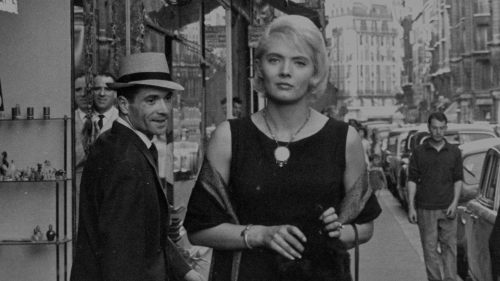Broad Cinema: The Shakespearean Satire Of 10 THINGS I HATE ABOUT YOU
From Alice Guy-Blaché to Ava Duvernay, women have been integral to cinema for the last 120 years. Broad Cinema is a new column that will feature women who worked on films that are playing this month at the Alamo Drafthouse. From movie stars to directors, from cinematographers to key grips, Broad Cinema will shine a spotlight on women in every level of motion picture production throughout history.
For June we are celebrating screenwriting duo Karen McCullah and Kirsten Smith. Get your tickets to the She's The Man Movie Party at the Alamo Drafthouse here!
High school comedies aren't generally thought of as deep intellectual works, particularly if they arrived within the decades surrounding the obliterative apocalypse of Y2K. Sure, there were lots of exceptions like Mean Girls or Clueless which functioned as social commentaries on their subjects and genres, but classics of the genre such as Bring It On and She's All That function primarily as starring vehicles for attractive people to have some light comic fun that left their audiences satisfied in the theater and later on Sunday afternoon cable runs. But writers Karen McCullah and Kirsten Smith made a clever observation about the teenage psyche in their first feature, 10 Things I Hate About You, which would lay the groundwork for the duo to forge a career out of that singular witty observation: upper-class high schoolers are essentially the modern equivalent of the aristocrats William Shakespeare satirized in his most biting comedies.
When you break it down to its basic components, the comparison is so obvious that it's surprising it hadn't been done before. By the very circumstance of being just old enough to understand that there's a greater world beyond themselves, yet just young enough to have underdeveloped notions of empathy as their self-image and self-awareness begin to take shape, teenagers of certain economic privilege are precisely the kind of self-centered narcissists that Shakespeare mocked in his aristocratic satires. One of the most notable examples is The Taming of the Shrew, which 10 Things I Hate About You is loosely based on. European aristocrats as depicted in Shrew were a cloistered bunch, cut off from the worries and troubles of common people as their wealth insulated them from real problems, so they invented petty dramas as a form of entertainment, backstabbing and politicking for no real gain other than to make the higher-class nobles feel a smug superiority over the nobles they deemed less worthy. Sounds an awful lot like the archetypal high school cliques, doesn't it? Replace the higher nobles with jocks and cheerleaders, and the lower nobles with dweebs and geeks, and the parallels between the insular social pressures of the eras are readily apparent. Shakespeare was an adept commentator on human nature, and what McCullah and Smith picked up on was that human beings really don't change all that much even as styles and technologies develop across centuries.
Each of the crafted characters of 10 Things I Hate About You has something to say about self-absorption through their motives and their developmental arcs. Cameron (Joseph Gordon-Levitt) kicks things into motion by conspiring to nab a date with Bianca (Larisa Oleynik), not because he actually knows what she's like or because he particularly even wants to, but because she's a hot girl and as a nice guy he feels that he's entitled to have a bit of that kind of action. Michael (David Krumholtz) serves as our expository hand-holder who devises a scheme to get Cameron his date less because he wants to help the new kid out than because he wants to increase his own social standing within the halls of the high school. Cameron and Michael are our scheming lower nobles. Bianca, meanwhile, is our eligible lady of high standing and is concerned primarily with getting a date for prom, held back by her father's (Larry Miller) insistence that she cannot date until her resistant older sister Kat (Julia Stiles) does. Bianca isn't concerned with either her father's feelings, grounded in his own self-centered feelings of parental obsolescence, or her sister's, whom she constantly calls out as abnormal despite not knowing why her sister refuses to conform to her peers. Meanwhile, Cameron and Michael conspire to get the eternally cold Kat a date by hiring bad boy Patrick (Heath Ledger) to ask her out. They enlist the financial backing of Joey (Andrew Keegan), a wealthy narcissistic model whose only concern is to get it on with Bianca himself, despite Cameron's desire to do the same and Cameron's unfounded belief that Bianca would prefer him.
This finally brings us to our ostensible leads. Patrick has a reputation as a rebel and an outsider, a rogue element in the hierarchy of adolescent politics who is rumored to have spent time in prison and have lost bodily organs in violent scuffles. In reality, Patrick's just an antisocialite, a survivor in the high school hellscape who exploits his rumor-founded reputation to avoid dealing with the shallow intellectual pool of his peers. Kat, meanwhile, is an ardent feminist and vocal critic of establishment norms. Her grievances are all legitimate but are consistently shot down by a student population that doesn't care about injustices so much as they do about their petty personal power grabs. However, it is eventually revealed that the roots of her shrewish reclusion are grounded in an unhealthy dating relationship with the narcissistic Joey, and she consequently refused to subject herself to the arbitrary standards of high school popularity at the cost of her personal autonomy.
Even though these two are the impetus for the growth and development of the inciting and secondary cast, they aren't without their self-centered tendencies themselves. Patrick's primary conflict as he actually starts to fall in love with Kat is not whether he should continue to accept Joey's money for their dates, but whether his dishonesty will get him in trouble. Kat, meanwhile, operates on the assumption that her refusal to date has protected Bianca from making the same mistakes she made, which inadvertently robs Bianca of the opportunity to learn and grow into a more well-rounded person.
This is interweaved with a sly commentary on the limits of empathetic development in such an affluent setting as expressed in English teacher Mr. Morgan (Daryl Mitchell). Acting as our Shakespeare surrogate among a faculty that is just as self-absorbed and conceited as the student body, Mr. Morgan is the character that consistently calls out Kat and other students—most notably a group of faux-Rastafarian white dudes—on the self-righteousness of their indignation when they themselves haven't experienced the types of oppression they preach or have any experience helping those who have. The unspoken truth is that as a Black man in America, Mr. Morgan is inherently more familiar with oppression than his White privileged students could reasonably conceive. It's a small role that places into focus the conceitedness of a relatively affluent cast that makes the parallel to a cloistered aristocracy just short of obvious.
Now because this is a comedy, everyone gets a happy ending. Bianca realizes that Joey is a self-absorbed user of women, and Cameron puts in enough kindness tokens to get the girl he lusted after from the beginning. Joey pairs off with Bianca's equally conceited friend Chastity, and even Michael gets a girlfriend in the Shakespeare-obsessed Mandella. (Subtle.) And, of course, Kat discovers that Patrick has been paid to date her, but a simple romantic gesture with the earned funds puts Patrick back in Kat's good graces. These characters have grown and matured over the course of their convoluted journeys of mutual introspection, but they are still limited by the fact that they are teenagers, just as Shakespeare's European aristocracy is limited in their development by the stunted growth of their peers. Karen McCullah and Kristen Smith saw a parallel between Shakespeare's take on noble egocentrism and teenage angst that borders on genius, and it's a theme they would later revisit in She's the Man while continuing to deconstruct genre with films like Ella Enchanted and Legally Blonde. But 10 Things I Hate About You is an under-acknowledged gem of its era, a step above the wave of teen comedies that drowned the market in terms of comedic joy and intellectual heights. …Even if Kat's final poem actually lists fourteen things she hates about Patrick.
Get your tickets to the She's The Man Movie Party at the Alamo Drafthouse here!



